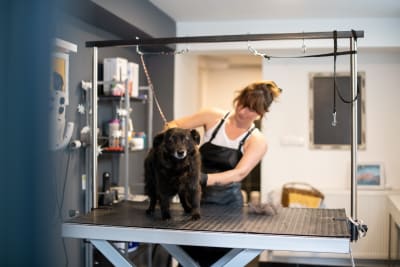In the article below, we lay down the various steps involved in becoming a veterinarian in Kansas in intricate and careful detail. We don’t stop there; however, we also examine the possible license requirements for veterinarians nationwide and the unique conditions applicable to veterinarians in Kansas only.
Furthermore, we also provide an overview of some of the most respectable and accredited veterinary schools in the area, along with other options in neighboring cities for those who want to expand their horizons. Lastly, aspiring veterinarians in Kansas will also find below an extensive section highlighting the possible salary projections at various points of their careers.
How to Become a Veterinarian in Kansas
Below are the steps to starting a career as a veterinarian in Kansas.
Step 1: Starting from High School
Admission into veterinary colleges is just as competitive as admission into medical school. For this reason, candidates are advised to begin their preparations from high school.
They can do so by becoming familiar with biology and chemistry subjects, maintaining a high GPA, and acquiring leadership and teamwork skills. They may also volunteer in animal shelters and work on becoming familiar with animals.
Step 2: Undergraduate Programs
During their undergraduate years, future veterinarians in Kansas prepare for subsequent admission into veterinary college. The aim is to obtain a bachelor’s degree in a pertinent field while acquiring enough extra-curricular experience in leadership, teamwork, and interpersonal-related activities to improve the chances of securing admission into a quality veterinary college.
Maintaining a high CGPA and receiving letters of recommendation are also essential to stand out from the competition.
Step 3: Graduation from an Accredited Veterinary School
The body responsible for accrediting veterinary colleges in Kansas and the entire country is the American Veterinary Medical Association, particularly the association’s Council on Education.
There are only a handful of accredited programs nationwide, making securing admission into a veterinary school highly competitive. Candidates who successfully secure admission into a veterinary college will receive training through classroom courses and clinical rotations.
The classroom courses are usually reserved for the first three years of school, while the final year tends to involve real-world clinical rotations. In the end, candidates will graduate with a Doctor of Veterinary Medicine degree and be able to secure employment.
The North American Veterinary Licensing Exam (NAVLE)
The NAVLE is a computer-based multiple-choice exam consisting of 360 questions that all aspiring veterinarians must pass before securing employment. The examination can be completed anytime, but most candidates apply during the senior year of veterinary school before graduation.
Consider exploring careers with similar paths:
Top Veterinary Schools in Kansas
The following are some of the most relevant options for future veterinarians in Kansas to consider.
Kansas State University
Manhattan, KS Online + Campus
The veterinary program at the College of Veterinary Medicine of Kansas State University is accredited by the American Veterinary Medical Association. It is known to produce numerous successful graduates every year. Competition is fierce, but candidates who get accepted may look forward to high-quality classroom and hands-on education.
Tuition
$11,876 - $28,348Contact
(785) 532-6011
registrar@k-state.edu
University of Missouri-Columbia
Columbia, MO Online Only
The University of Missouri-Columbia’s College of Veterinary Medicine is another excellent AVMA-accredited destination for training as a prospective veterinarian in Kansas. Admission is available for all, so long as they follow the guidelines outlined on the school website.
Tuition
$14,122 - $38,240 per YearContact
(573) 882-7786
askmizzou@missouri.edu
Consider exploring schools in neighboring states:
Licensure & Certification Requirements
In Kansas, veterinarians must have their NAVLE, but they must also comply with the state licensure guidelines outlined by the Kansas Board of Veterinary Examiners.
The board specifies a $125 licensing fee that must be renewed annually. Veterinarians in the state must go through 20 hours of continuing education every year and provide proof of citizenship or alien status before securing legal employment.
Salary & Career Outlook
Veterinarians in Kansas earn an annual average salary of $113,399. The top 10% earn an average yearly salary of $115,384, while those in the bottom 10% earn an annual average salary of $82,758.
Concerning the factors that affect the annual average salary of a veterinarian in Kansas, they include experience, location, area of specialization, and type of establishment they work in, among others.
Those looking to optimize their location may consider working in any one of the highest-paying locations for veterinarians in Kansas. They include Overland Park, with an annual average salary of $123,349; Manhattan, with an average yearly salary of $124,091; Hutchinson, with an annual average salary of $118,230; and Lawrence, with an average yearly salary of $117,377.
The city of Lenox completes the top five with an annual average salary of $115,162.





